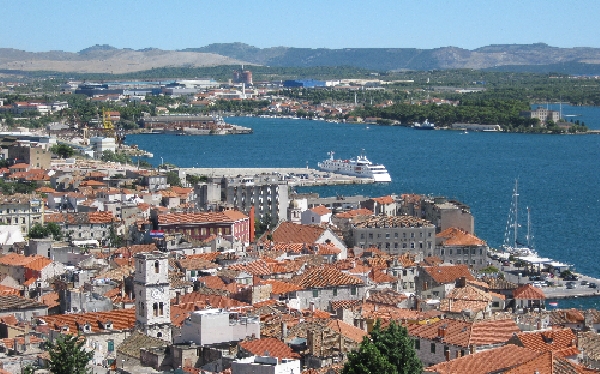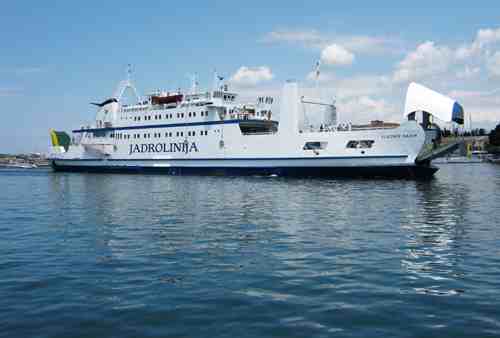After ten very enjoyable and relaxing days on Dugi Otok, we returned by ferry to Zadar and headed slightly further down the coast to Šibenik. The ancient city centre of Šibenik has a network of steep pedestrianized streets which are fascinating to explore and in the midst of which is the Cathedral Church dedicated to St. James.

The Cathedral was constructed during a period of just over 100 years between 1431 and 1536. It is built entirely of stone quarried from nearby islands without any brick or wooden supports. Large stone blocks or slabs were brought together in such a way that the edge of one slab entered into the groove of the second slab. It is reputed to be the world’s largest Church built in this manner.
On the outside of the Cathedral are many fascinating carvings including 71 different heads with a variety of facial expressions.

| On the north wall, either side of one of the entrances, Adam and Eve are portrayed, both holding onto their fig leaves and looking somewhat embarrassed! | |
 |
 |
| As Sybille and I have, at different times, both made the pilgrimage to Santiago de Compostela, the reputed burial place of St. James, we were interested to see how he was portrayed. We discovered that he appears not once, but twice in carvings on the Cathedral exterior. At the pinnacle of the chancel roof, he is portrayed as St. James the Teacher with book in hand. However, on the north wall, immediately above Adam, he is portrayed in his more usual role as St James the Pilgrim. Unfortunately, his pilgrim staff is in need of some repair. | |
 |
 |
| By steadily climbing up through the ancient narrow streets of Šibenik, it is possible to visit the citadel fortress that overlooks the city. The effort is more than worthwhile for the magnificent views back down on the Cathedral and across to the nearby islands. | |
 |
|




Wow, that last view of the sea…breathtaking.
Greetings from the Cote d’Azur to you and Sybille from a British expat (and member of the Anglican Communion). Great blog! So glad I visited. Especially appreciate your informative reflections, observations and excellent pix on your trip along the Dalmatian coast.
Fascinated to hear you’ve both walked el camino, as it’s one of my ambitions – wondering if I’ll ever make it rather than reading books/watching films about it ;-)!
Hi Minnie and welcome to my blog! I’m glad you found it.
Thank you for your kind comments. You may also appreciate my final blog about our Croatian odyssey which I’ve just posted. I’m hoping to have a good read of your blog (thanks for the link!) later this evening.
The only way you’ll walk the Camino de Santiago is if you create a time period (minimum 4 weeks, depending where you start) and determine to do it! Help & guidance freely offered if you would like it.
Thank you, Ricky – would love to hear more about the Camino from people who’ve done it; but it’s finding the chunk of time to devote to the enterprise that’s the stumbling block, I fear. Still, if such a period turns up, I’ll know who to ask for guidance.
PS That’s an Italian Renaissance building, Venetian-style, if ever I saw one! Wasn’t the Dalmatian coastal area either subject to the Republic of Venice or a close trading partner thereof during those times? Hm. Gorgeous, anyway! And great to do some armchair travelling.
Sorry Minnie – meant to reply to your last comment some days ago. Yes – a good part of the Dalmatian coast was subject to Venetian rule for quite some time so the influence of their architectual style is to be expected. According to my guide both the architects and builders of the Cathedral were either Venetians or had worked in Venice.